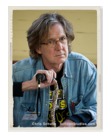“Arming the Mind with New Ideas”
 That was the rallying cry of outraged librarians during World War II when it became known the Nazis had banned or burned millions upon millions of books. They organized book fairs to collect donated books to send to the GIs fighting on the continent, “arming” their minds with better ideas. Maybe you heard the story on NPR last week. Not too many of the books were what you’d call scintillating, though – Emily Post’s Etiquette, “Popular Mechanics”, or One Man’s Meat – however good the idea was. The War Department and publishers got together and started producing smaller, cheaper copies of popular titles and classics. “Armed Forces Books.” They were designed to fit in the pocket of fatigues or the fold of a rucksack, using a paper grade about the same as newsprint. The corporate bean counters estimated a single copy would last maybe six readings, that is six possession changes, before falling apart, given the conditions. There are stories of soldiers reading in the landing craft on the way to Normandy, books being smuggled into POW camps, books on the prep lists for airborne and naval maneuvers and books provided to liberated citizens of Europe. A fascinating new book came out earlier in the month, When Books Went to War, by Molly Guptill Manning. She reports that the program revived Gatsby. And one other especially interesting tidbit she uncovers is that she gathered evidence that there were books that lasted far more than six exchanges. One book, A Tree Grows in Brooklyn (1943), by Betty Smith, had a waiting list at one point of over thirty names! Manning postulated that the book was so popular because it reminded the GIs of home, even non-New Yorkers. At least that’s what they said in numerous letters they wrote to the author. I like knowing that one fact right there. I was so pleased I went to amazon.com to see if Tree was still in print, still available. It is!
That was the rallying cry of outraged librarians during World War II when it became known the Nazis had banned or burned millions upon millions of books. They organized book fairs to collect donated books to send to the GIs fighting on the continent, “arming” their minds with better ideas. Maybe you heard the story on NPR last week. Not too many of the books were what you’d call scintillating, though – Emily Post’s Etiquette, “Popular Mechanics”, or One Man’s Meat – however good the idea was. The War Department and publishers got together and started producing smaller, cheaper copies of popular titles and classics. “Armed Forces Books.” They were designed to fit in the pocket of fatigues or the fold of a rucksack, using a paper grade about the same as newsprint. The corporate bean counters estimated a single copy would last maybe six readings, that is six possession changes, before falling apart, given the conditions. There are stories of soldiers reading in the landing craft on the way to Normandy, books being smuggled into POW camps, books on the prep lists for airborne and naval maneuvers and books provided to liberated citizens of Europe. A fascinating new book came out earlier in the month, When Books Went to War, by Molly Guptill Manning. She reports that the program revived Gatsby. And one other especially interesting tidbit she uncovers is that she gathered evidence that there were books that lasted far more than six exchanges. One book, A Tree Grows in Brooklyn (1943), by Betty Smith, had a waiting list at one point of over thirty names! Manning postulated that the book was so popular because it reminded the GIs of home, even non-New Yorkers. At least that’s what they said in numerous letters they wrote to the author. I like knowing that one fact right there. I was so pleased I went to amazon.com to see if Tree was still in print, still available. It is!I’ve always had a hunch that books could be so much more than entertainment. They could be downright therapeutic. One of the last books I read in Japan was Irving’s Garp after it came out in the middle 70s. On nothing more than that hunch I mailed the book back stateside to older brother Jeffrey who was recovering from a pretty nasty leg fracture. Jeffrey’s always been a rabid reader. I remember whenever any books or magazines were out of place, or missing – of any subject matter – the first place to check was under Jeffrey’s bed. The next time I saw him – had to be a couple of years – he told me Garp was the best recuperative book he’d ever read. Granted, Jeffrey’s a certain brand of crazy: the broken femur was the result of his blocking the plate during a pick-up softball game. No one had to wonder whether Jeffrey held onto the ball after the nauseating snap of his leg. But I think he’s a beautiful kind of crazy. He doesn’t talk a whole lot, or very loud. When he does though, I’ve learned, it’s either very, very funny, or it’s a declaration loaded with conviction and consideration. I’ve probably given away a couple dozen copies of Garp since, and plan to again next week, and even reread it myself it from time to time.
Among the things I’ve picked up from reading interviews with Irving over the years – especially in that great old series, “Writers at Work,” Paris Review used to run annually, but are likewise still available – is that, he says, every book starts out with a proposition, “What if?” I’ve always thought exquisitely simple and succinct – particularly after experiencing how damned difficult it is to answer, “What’s the book about?” or write a decent description in the two or three sentences you get on the back cover. Waffle House, again, because it was all mine (comparatively) started that way. What if there was a kid whose life was almost entirely determined by tragedy?
The other thing Irving said was that he almost always writes the ending first. I haven’t had much success emulating that one (though I do think about the ending sooner in the process). It mostly mystifies me (or annoys, if I’m really pissed at John). How can you write the ending first? Doesn’t that change in the process from beginning to end? (Happens a lot to me, at least: something else we can talk about.) I certainly didn’t know the ending of Waffle House before starting. I did know the end of the story, though, the end of Jimmy Ryan’s story. In a story about a character’s life marked by comprehensive and continuous tragedy, in a book necessarily with a pretty high body count, there was no way I could sneak up on the subject of death. So I though Jimmy’s burial a right and proper place to start.
Or, if you don’t like that answer, it was at least a fun thing to do. Sometimes writing can be so frustrating, you have to figure out some way, any way to have some fun. I could concoct imaginary Q&A sessions, where, when the question inevitably comes – though there is another question I just knew would come up, but hasn’t – I can answer, “I thought I’d break some rules with this one, from the beginning; thought it’d be fun to bury my lead character.”
Published on December 19, 2014 13:51
No comments have been added yet.



